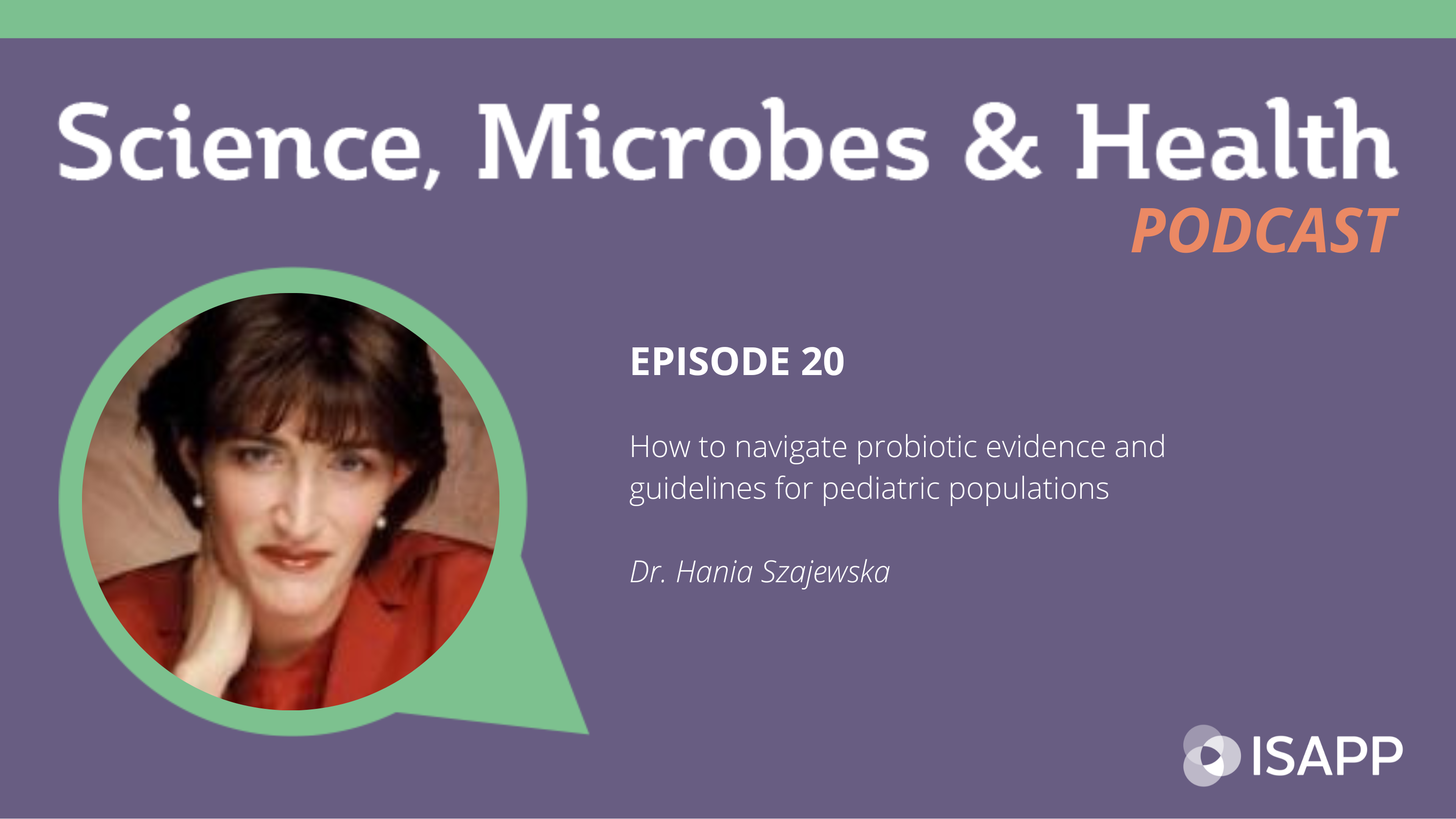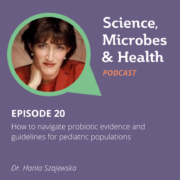Episode 20: How to navigate probiotic evidence and guidelines for pediatric populations

Podcast: Play in new window | Download
Subscribe: Apple Podcasts | Spotify | RSS
The Science, Microbes & Health Podcast
This podcast covers emerging topics and challenges in the science of probiotics, prebiotics, synbiotics, postbiotics and fermented foods. This is the podcast of The International Scientific Association for Probiotics and Prebiotics (ISAPP), a nonprofit scientific organization dedicated to advancing the science of these fields.
How to navigate probiotic evidence and guidelines for pediatric populations, with Dr. Hania Szajewska
Episode summary:
In this episode, the ISAPP podcast hosts talk about evidence and guidelines for probiotics in pediatric populations, with Prof. Hania Szajewska MD PhD, of the Department of Paediatrics at the Medical University of Warsaw, Poland. They talk about some of the inconsistencies between different medical organizations’ guidelines for pediatric probiotic use, and how clinicians can move forward with recommendations based on the best available evidence.
Key topics from this episode:
- Guidelines exist on probiotic use for gastroenterological issues in children, but there are differences (especially regarding acute gastroenteritis) between guidelines from different medical societies: European Society for Paediatric Gastroenterology Hepatology and Nutrition (ESPGHAN) and The American Gastroenterological Association (AGA).
- Realistic expectations are necessary when prescribing probiotics. Different probiotics have different benefits, but they are not a ‘magic bullet’. For example, the evidence shows certain probiotics for acute gastroenteritis reduce diarrhea by an average of one day. This could have a big impact on the quality of life of the end user, but for clinicians it may not sound like a lot so they must set expectations accordingly.
- The market is overflowing with probiotic products, many of which do not have proven efficacy. This makes it difficult for end users and healthcare professionals to distinguish the best products.
- Always look for evidence-based probiotics with documented efficacy for the indication for which they are intended.
- Physicians have the ethical duty to prescribe evidence-based products (that is, clinically proven, effective products).
- The exact strains and doses matter.
- Formal training and education of healthcare professionals regarding the beneficial effects of microbes, the microbiome, and probiotics are currently lacking.
- Is it more valuable to know probiotics’ mechanism of action, or to have evidence from clinical trials that they are effective?
- Ideally we would have both, but since we don’t know the exact mechanism for all probiotics, positive evidence from clinical trials is crucial.
- We also need to make clear to healthcare professionals and end users what to expect from taking probiotics. For example, some probiotics reduce the chances of developing antibiotic-associated diarrhea by 50%. For colic, some probiotics can reduce the crying time by half an hour. These are modest benefits but for the affected individual they may be impactful.
- For vulnerable populations such as preterm infants, we need high-quality products with proven safety and efficacy.
Episode abbreviations and links:
- The website for the European Society for Paediatric Gastroenterology Hepatology and Nutrition (ESPGHAN): https://www.espghan.org/
- See here for a primer on evidence-based medicine: The Centre for Evidence-Based Medicine.
- The new ESPGHAN guidelines on probiotics: Probiotics for the Management of Pediatric Gastrointestinal Disorders: Position Paper of the ESPGHAN Special Interest Group on Gut Microbiota and Modifications.
- Important clinical trial on a probiotic for acute gastroenteritis: Lactobacillus GG administered in oral rehydration solution to children with acute diarrhea: a multicenter European trial.
- Recently published clinical trial co-authored by Prof. Szajewska on prevention of antibiotic-associated diarrhea: Multispecies Probiotic for the Prevention of Antibiotic-Associated Diarrhea in Children: A Randomized Clinical Trial.
- This paper co-authored by Prof. Szajewska shows an example of actionable evidence: Lactobacillus reuteri to Treat Infant Colic: A Meta-analysis.
- Paper by ESPGHAN on the need for independent verification of probiotic quality: Commercial Probiotic Products: A Call for Improved Quality Control. A Position Paper by the ESPGHAN Working Group for Probiotics and Prebiotics. Also see Improving End-User Trust in the Quality of Commercial Probiotic Products.
About Prof. Hania Szajewska:
Hania Szajewska, MD, is Professor and Chair of the Department of Paediatrics at the Medical University of Warsaw and the Chair of the Medical Sciences Council. Among her various functions, she served as the Editor-in-Chief of the Journal of Pediatric Gastroenterology and Nutrition; a member of the Council and then as the General Secretary of the European Society for Paediatric Gastroenterology, Hepatology and Nutrition (ESPGHAN); the Secretary of the ESPGHAN Committee on Nutrition. Most recently, she joined the Board of Directors of the International Scientific Association for Probiotics and Prebiotics (ISAPP). Prof. Szajewska has broad interests in pediatric nutrition but her research focuses on the effects of early nutritional interventions on later outcome; and the gut microbiota modifications such as with various biotics (probiotics, prebiotics, synbiotics, postbiotics). She is or has been actively involved in several European Union-funded research projects. She is an enthusiastic advocate for the practice of evidence-based medicine. Prof. Szajewska has co-authored more than 400 peer-reviewed publications and 30 book chapters. Citations >18,141. Hirsch index 72 (WoS, March 2023).





